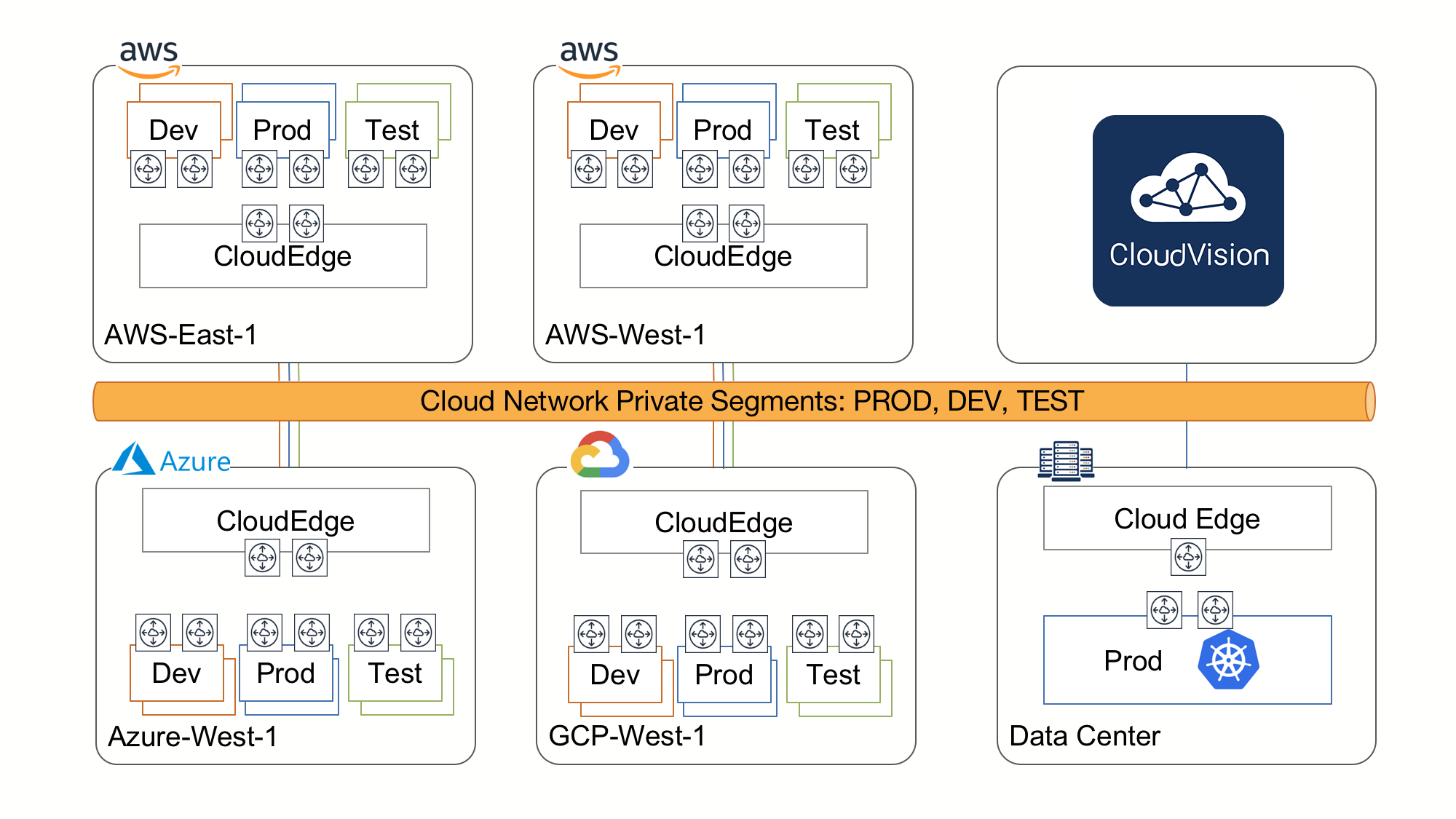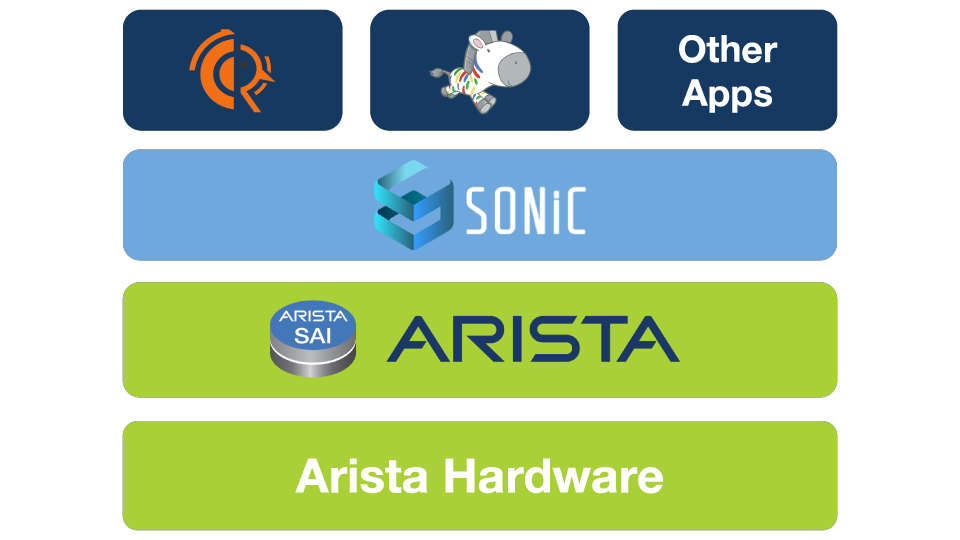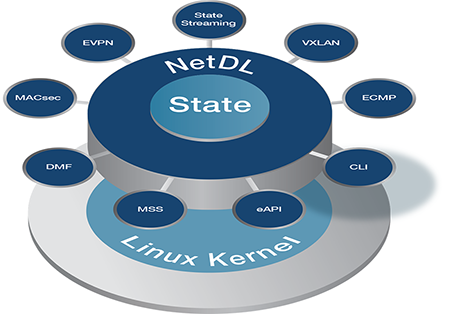Overview:
The World’s Most Advanced Network Operating System
Arista Extensible Operating System (EOS) is the core of Arista cloud networking solutions for next-generation data centers and cloud networks. Cloud architectures built with Arista EOS scale to hundreds of thousands of compute and storage nodes with management and provisioning capabilities that work at scale. Through its programmability, EOS enables a set of software applications that deliver workflow automation, high availability, unprecedented network visibility and analytics and rapid integration with a wide range of third-party applications for virtualization, management, automation and orchestration services.
Arista EOS is a fully programmable and highly modular, Linux-based network operation system, using familiar industry standard CLI and runs a single binary software image across the Arista switching family. Architected for resiliency and programmability, EOS has a unique multi-process state sharing architecture that separates state information and packet forwarding from protocol processing and application logic.
Cloud Scale Architecture
- Scale to your needs, from 100 to 100,000+ compute and storage nodes
- Resilient and proven software operating system based on the publish / subscribe state sharing foundation and evolving to NetDB for a network-wide software infrastructure for centralizing and streaming network state for improved visibility analytics
- Open, standards-based design approach with MLAG at Layer-2, ECMP at Layer-3 with effective use of all available bandwidth in non-blocking modes while providing failover and resiliency
- Network virtualization using overlay technologies such as VXLAN for seamless workload mobility network segmentation, and application extension
High Availability
- Reduce maintenance windows with Arista Smart System Upgrade (SSU) reduces maintenance windows through intelligent insertion and removal of network elements
- Live patching and upgrade of individual processes within EOS during normal switch operation
- Self-healing resiliency for minimum downtime with fault containment to a single module and process restart without the need to rebuild state information
- Custom monitoring, failover and load balancing with third-party integration for custom monitoring, failover and load balancing
Automation
- CloudVision platform for automating the workflows of network operations tasks through the portal
- CloudVision for simplified and scalable integration of the physical network with solutions from Arista ecosystem partners, including VMware, OpenStack, Palo Alto Networks, Microsoft, and many others.
- Simplified provisioning for new and replacement switches with Zero Touch Provisioning (ZTP) and Zero Touch Replacement (ZTR)
- Advanced Event Management for automated responses to network and application events
- Automate complex IT workflows and simplify network operations to individual requirements through rich programmatic capabilities
- Automation Integration with partners enhance native capabilities with tools such as Puppet, Chef and Ansible and extends automation up the stack to include other network systems and applications including firewalls, load balancers and compute infrastructures with partners such as F5 and VMware.
Open and Programmable
- Offering numerous programmability options Arista EOS enables programmatic control of the network.
- Rich, well-structured set of APIs, including:
- eAPI JSON based RPC, providing a REST-like interface using native CLI commands
- OpenConfig, Go, Python and Ruby based object models
- Native Go and Python on box scripting
- Develop native high performance applications using EOS SDK
- Native Linux APIs and scripting
- Tight dev-ops integrations with Puppet, Chef and Ansible
Visibility
- Unprecedented visibility into application performance and network-wide monitoring capabilities for both industry standards and customer specific DevOps solutions
- Simplified TAP Aggregation with the Arista Data Analyzer (DANZ) feature set
- Rapid identification and troubleshooting of application and network performance problems through tracers such as Cloud TracersTM, VM Tracer, MapReduce Tracer, Path Tracer, Health Tracer, Container Tracer, Latency Analyzer (LANZ) and also sFlow monitoring.
Flexible Consumption Models
- Packaged as bundled EOS on Arista switches, Containerized EOS (cEOS), or virtualized EOS (vEOS) for any production or simulation use case and for flexible platform support, including 3rd party hardware
- cEOSTM (Containerized EOS) – Extending cloud automation and operation models for DevOps and NetOps integration and for flexible platform support, including 3rd party hardware
CloudEOS:
Introducing CloudEOS - Cloud Networking Infrastructure as Code
CloudEOS is Arista’s multi-cloud and cloud-native networking solution supporting autonomic operation to deliver an enterprise-class, highly-secure, and reliable networking experience for any cloud. As part of the Arista EOS® and CloudVision® product family, it delivers consistent segmentation, automation, telemetry, provisioning and troubleshooting for the enterprise edge, WAN, campus, data center and multiple public and private clouds.
To provide a scalable and automated network experience, CloudEOS integrates with Arista CloudVision to simplify the operators experience of interconnecting and managing multi-cloud, cloud-native and on-premises enterprise networks. Leveraging a network-wide approach for workload orchestration and workflow automation, together with advanced network telemetry and standards-based programmability, CloudEOS and CloudVision provide a seamless and universal approach to multi-cloud networking.

CloudEOS, deployed with Universal Cloud Network Designs, provides the vital missing elements required for building multi-cloud connectivity with consistent isolation across the entire enterprise environment. It delivers consistent high-performance virtual machine and container-based instances of EOS software that simplify network operations with declarative cloud provisioning tool chains like Terraform, Ansible and other popular CloudOps and DevOps solutions that are used to deploy the entire application stack.
With CloudEOS, customers can take full advantage of their multi-cloud and cloud-native investments without compromising on the network reliability, security and predictability that they expect from Arista.
Arista CloudEOS Router - Summary of Key Capabilities
Declarative Cloud Provisioning - using the popular Terraform application, a platform engineering team can stand up virtual private cloud instances in multiple public cloud providers with a single additional line of code per VPC. Terraform will automatically deploy an Arista CloudEOS leaf router, or a high availability pair of routers, and establish secure connectivity to a CNPS for each connected VPC.
Multi Cloud Reachability and Scale - any resource elastically scales up/down within the public cloud its instantiation and real-time addressing are maintained coherently across the entire CNPS segment, even across cloud providers in high-velocity environments like Kubernetes.
Elastic Scaling and Consumption - for cloud delivered functions like segment control points, edge transit routers, and cloud spine nodes the architecture is designed to enable these nodes to be procured in and through the public cloud providers and billed based on the actual consumption in a Pay-as-You-Go model.
Enhanced Visibility and Analytics - each networking node within the CNPS streams telemetry data back to Arista CloudVision which can be deployed in the public cloud in a VPC or on-premises. This enables a digital replica of the network state to be available for analytics or as training data for supervised machine learning models.
Product Highlights
Cloud Grade Routing
- Multi Cloud: routing VM – optimized for public and private clouds and available in major public cloud marketplaces – including Amazon AWS, Google Cloud Platform, and Microsoft Azure
- Cloud Native: container version – extends CloudEOS into the Kubernetes cluster for auto-provisioning, consistent routing, improved visibility and better troubleshooting
- Transitive Routing: connects multiple Virtual Private Clouds (VPCs) together with a normalized connectivity pattern and the same proven Arista EOS software used in all Arista networking platforms
- UCN: Universal Cloud Network (UCN) standards-based network designs within and across public clouds; for leaf-and-spine and edge-to-edge connectivity through a standards-based BGP layer-3 EVPN or reliable leaf-and-spine routed topologies
- Site-to-Site: connect public clouds, data centers and campus sites with high-speed WAN interconnection using IPsec VPN encryption and dynamic path selection
Key Features and Capabilities
- Cloud Network Private Segments (CNPS): VXLAN and IPsec based Virtual Private Networks (VPNs) spanning cloud regions and providers, to enable a secure, global and consistent segmentation model
- Dynamic Path Selection (DPS): with In-band Path Telemetry for cloud edge use cases, providing reliability connectivity over diverse WAN segments
- Network Address Translation (NAT): provide IP address flexibility in any VPC
- Telemetry streaming: based on open source gNMI, gRPC, and OpenConfig standards delivering greatly improved network visibility and troubleshooting
Autonomic Cloud Operations
- Elastic: Pay-As-You-Go (PAYG) consumption through Public Cloud Marketplaces and Service Catalogs
- All Inclusive: includes CloudVision with Terraform integrations, all EOS routing and telemetry features, and A-care software support
- Consistent operational model: Arista EOS and CloudVision complemented with DevOps and CloudOps toolchain integrations like Terraform
- Open Programmability: programmable via JSON API (eAPI) or EOS SDK, with support for Python, Go, Ansible, NetConf, and OpenConfig
Performance and Reliability
- Cloud High Availability (HA): utilizing Bi-directional Forwarding Detection (BFD) and multi-path routing (ECMP) for fast recovery and continuous operation
- High Performance Data Plane (DPDK/SR-IOV): increases throughput while reducing latency, jitter, and CPU utilization to deliver the ultimate performance in any cloud or hardware platform
- Latest Cloud Architecture: utilizing Microsoft Azure Accelerated Networking and Amazon AWS Enhanced Networking for efficient resource utilization in public cloud instances
EOS+ Platform:
EOS+ is a software platform for network programmability. EOS+ enables programmatic control of the network with end-to-end solutions, providing customers the ability to automate their network for reduced operational cost and improved responsiveness for managing workloads and workflows. EOS+ offers pre-built applications from Arista and a wide variety of partners with the ability to customize directly or with assistance of Arista EOS Software Consulting services. EOS applications provide complete solutions with support from Arista’s Technical Assistance Center (TAC).
Key Platform Offerings
EOS Applications
- Fully TAC supported applications addressing key network automation needs
- Customizable to individual network needs by the customer or with the support of EOS Consulting Services
- Key applications:
- ZTPServer - Enabling zero touch intelligent dynamic end-to-end network provisioning
- EOS Telemetry Suite - Providing targeted data collection with configurable intervals, thresholds, and alerts
- EOS DirectFlow Assist (DFA) for Security Acceleration - Designed to offload or assist an attached in-line or out-of-band security platform such as a firewall
EOS Consulting Services
- Leveraging industry recognized experts to help advise and build a Software Driven Cloud Network
- Expert advice and implementation of network focusd DevOps tools and methodologies designed to accelerate business agility
- Onsite or remote EOS-focused development with a team of seasoned network software programmers
EOS Development Environment
- Rich, well-structured set of APIs, including eAPI and Linux APIs, and SDK making all layers programmable
- vEOS, a virtual test environment for EOS, to accelerate application deployment and development
- EOS SDK for direct integration with switch operating system for network applications that require low latency and high performance
Open Networking:
Arista Networks pioneered the open networking model with Arista Extensible Operating System (EOS) - a fully programmable and highly modular, Linux-based network operating system, supporting a broad set of merchant silicon architectures, driving Cloud Networking deployments. As part of the commitment to Open Networking, Arista provides a range of solutions addressing the various needs of cloud providers through disaggregation in 5 core areas:
- Hardware platforms
- Platform drivers
- Network operating systems
- Virtualization / containerization
- Complete solutions
Arista’s open networking initiatives in collaboration with the world’s largest cloud operators on both software and hardware solutions include:
- Facebook’s OpenR project
- EOS on Facebook Wedge
- SONiC support on Arista switching and routing platforms
- Facebook F16 project with Arista 7368X modular switch
- Arista SAI for SONiC

Customers looking for deployment models to achieve both flexibility and agile service delivery can innovate with these disaggregation deployment models for open network software, consistent operating models, leveraging merchant silicon innovations across a set of platforms.
Open Networking Software with Arista
With extensive experience in building products for cloud use cases and long standing relationships with the community, Arista is uniquely positioned to help customers develop a best-of-breed approach to networking, with key benefits including:
- Flexible and Open Networking
- Choice of high performance platforms from Arista’s market leading data center portfolio for leaf and spine networks
- Cloud Principles Foundation
- Lower Opex by leveraging DevOps tools for consistent automation for compute and networking deployments
- Native streaming of deep platform telemetry with OpenConfig APIs
- High scale and extensive debugging capabilities leveraging from cloud deployment experience
- Consistent Operational model
- Standardizing on a set of platforms, Customers have the option of choosing between Arista EOS and Arista SAI with SONiC software as an added benefit, for broader network roles
- 24x7 Global Customer Support from Arista world-class services organization for SAI and platform related issues for a positive end-user experience.
An example of Arista open networking, SONiC is an open source network operating system developed initially by Microsoft for the Azure cloud platform that runs on multiple hardware platforms.
Arista’s Switch Abstraction Interface (SAI) layer allows SONiC to run on Arista switches, leveraging Arista’s advanced hardware design and platform drivers. Customers have the option of choosing between Arista EOS and Arista SAI with SONiC software, for broader network roles.

The Arista Open Networking solution offers a best-in-class foundation for Cloud providers, enterprises and service providers enabling seamless integration across any IT infrastructure that simplifies management and provisioning, speeds up service delivery, lowers costs and creates opportunities for agile introduction of new workloads.
Software Features:
Layer 2 Features
- 802.1w Rapid Spanning Tree
- 802.1s Multiple Spanning Tree Protocol
- Rapid Per Vlan Spanning Tree (RPVST+)
- VLANs
- 802.3ad Link Aggregation/LACP
- MLAG (Multi-Chassis Link Aggregation)
- 802.1Q VLANs/Trunking
- 802.1AB Link Layer Discovery Protocol
- Jumbo Frames (9216 Bytes)
- IGMP v1/v2/v3 snooping
- Storm Control *
Layer 3 Features
- Routing Protocols: OSPF, OSPFv3, BGP, MP-BGP, IS-IS, and RIPv2
- Equal Cost Multipath Routing (ECMP)
- IGMP v2/v3
- PIM-SM / PIM-SSM
- Anycast RP (RFC 4610)
- MSDP
- VRRP
- Virtual ARP (VARP)
- Policy Based Routing (PBR)
- Route Maps
- MPLS *
Advanced Monitoring and Provisioning
- Zero Touch Provisioning (ZTP)
- Port Mirroring
- Enhanced Remote Port Mirroring *
- SPAN/TAP M:N Aggregation *
- L2/3/4 Filtering *
- Advanced Event Management suite (AEM)
- CLI Scheduler
- Event Manager
- Event Monitor
- Linux tools
- Integrated packet capture/analysis with TCPDump
- RFC 3176 sFlow
- IEEE 1588 PTP
- OpenFlow
Virtualization Support
- VXLAN Gateway (draft-mahalingam-dutt-dcops-vxlan-01)
- VXLAN Routing *
- VXLAN Bridging
- VXLAN Tunnel Endpoint
- VM Tracer VMware Integration
- VMware vSphere support
- VM Auto Discovery
- VM Adaptive Segmentation
- VM Host View
Extensibility
- Linux Tools
- Bash shell access and scripting
- RPM support
- Custom kernel modules
- Programmatic access to system state
- Native KVM/QEMU support
Standards Compliance
- 802.1D Bridging and Spanning Tree
- 802.1p QOS/COS
- 802.1Q VLAN Tagging
- 802.1w Rapid Spanning Tree
- 802.1s Multiple Spanning Tree Protocol
- 802.1AB Link Layer Discovery Protocol
- 802.3ad Link Aggregation with LACP
- 802.3ab 1000BASE-T
- 802.3z Gigabit Ethernet
- 802.3ae 10 Gigabit Ethernet
- 802.3ba 40 Gigabit Ethernet
- RFC 2460 Internet Protocol, Version 6 (IPv6) Specification
- RFC 4861 Neighbor Discovery for IP Version 6 (IPv6)
- RFC 4443 Internet Control Message Protocol (ICMPv6) for the
Internet Protocol Version 6 (IPv6) Specification
- RFC 4862 IPv6 Stateless Address Autoconfiguration
SNMP MIBS
- RFC 3635 EtherLike-MIB
- RFC 3418 SNMPv2-MIB
- RFC 2863 IF-MIB
- RFC 2864 IF-INVERTED-STACK-MIB
- RFC 2096 IP-FORWARD-MIB
- RFC 4363 Q-BRIDGE-MIB
- RFC 4188 BRIDGE-MIB
- RFC 2013 UDP-MIB
- RFC 2012 TCP-MIB
- RFC 2011 IP-MIB
- RFC 2790 HOST-RESOURCES-MIB
- RFC 3636 MAU-MIB
- LLDP-MIB
- LLDP-EXT-DOT1/3-MIB
- ARISTA-QUEUE-MIB
- RFC 4273 BGP4-MIB
- RFC 4750 OSPF-MIB
- ARISTA-CONFIG-MAN-MIB
- RFC 2787 VRRPv2MIB
- MSDP-MIB
- PIM-MIB
- IGMP-MIB
- IPMROUTE-STD-MIB
- SNMP Authentication Failure trap
- User configurable custom OIDs
Documentation:
Download the Arista EOS Datasheet (PDF).
Download the Arista CloudEOS Router Datasheet (PDF).






